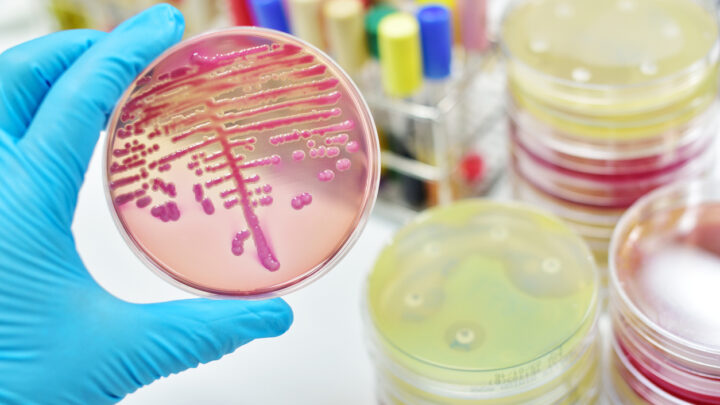There is ample elective opportunity to explore options within the diverse field of Medical Microbiology. Along with core laboratory training within the different microbiology discipline areas, clinical training in Infectious Diseases is integrated throughout the five-year training period, therefore developing both the clinical and laboratory skills and knowledge that are critical to the practice of Medical Microbiology. There are ample opportunities for research and residents are encouraged to participate in projects throughout their training. A successful mentorship program is in place to help guide and nurture residents during their time in the program and throughout the resident career planning phase. Structured, protected academic teaching is built into the curriculum and residents are encouraged to seek out learning opportunities that fit their individual goals.
Residents will carry out research in association with the faculty, which will also allow for more formal research training. The MM faculty has very strong research roots and all residents publish or present research before the completion of their training. Residents also demonstrate self-directed problem-based learning during weekly ID Academic PBL Half-days.
Program Information
There are two pathways that can be taken to meet specialty requirements and be eligible for the Royal College examination leading to FRCPC designation in Medical Microbiology: the direct-entry residency program and the ID+MM combined fellowship.
Direct-Entry Residency Program:
Medical Microbiology is a 5-year direct-entry residency available to MD applicants through the R-1 Main Residency match. The first year consists of clinical rotations in various fields of medicine. During the remaining 4 years, residents will participate in infectious diseases service rotations, bacteriology, virology, mycology, mycobacteriology, molecular microbiology, infection control, antimicrobial stewardship, laboratory management, public health microbiology, and Quality Assurance and research projects. Graduated responsibility has been built into these rotations and there are graduated expectations for call in both Infectious Diseases and Microbiology.
Five-Year Program Schedule:
PGY 1: This year consists of the transition to the discipline of medical microbiology, as well as foundational rotations in core clinical services including infectious diseases:
- 2 blocks Medical Microbiology
- 4 blocks General Internal Medicine
- 2 blocks ICU
- 2 block Emergency Medicine
- 1 block General Pediatrics
- 2 blocks Infectious Diseases
PGY 2-4: The PGY 2-5 years are made up of a blend of clinical Infectious Diseases and core microbiology including training in Public Health laboratories, community laboratories, Infection Control, and Antimicrobial Stewardship. Graded responsibility is incorporated into the training expectations and on-call responsibilities for each year of training. Time for external electives is protected for residents to pursue personalized training, research, or career goals.
PGY 5: The final year of training is planned to provide further experience in microbiology and the trainee accepts a greater level of responsibility, including Junior Attending blocks in microbiology and infectious diseases. Each resident will get an opportunity to act as the Chief Resident for the training program with added responsibilities such as generating the microbiology call schedule and planning/coordinating the Medical Microbiology Academic Half-day. Preparation for the Royal College examination is supported.
ID+MM combined fellowship:
Residents who have completed core training in internal medicine or pediatrics may pursue microbiology residency in conjunction with infectious diseases residency. Often, residents will match to the ID program first and then choose to switch to the combined program if it fits their career and academic goals.
The combined infectious diseases and medical microbiology residency is a three-year program. Successful candidates will participate in infectious diseases service rotations for 12 months, and complete rotations in bacteriology, virology, mycology, mycobacteriology, molecular microbiology, infection control, antimicrobial stewardship, laboratory management, and public health microbiology. Residents also have numerous opportunities to participate in research projects. Upon completion of the combined Medical Microbiology/ Infectious Diseases residency, the candidates will be qualified to participate in both medical microbiology and infectious diseases RCPSC examinations.
Education is a primary focus of the program, with protected time for numerous educational activities. These include:
- ID Academic Half-day – a 1.5-hour case-based session focused on covering a core topic in Infectious Diseases.
- MM Academic Halfday – a 1-hour session that follows the ID half-day and covers a range of laboratory and CanMEDs topics in an interactive lecture format.
- Microbiology Plate Rounds follow the Academic Half-days and review a laboratory topic at the bench level.
- Regional Infectious Diseases Rounds are held weekly and are attended by all residents and faculty. Residents are expected to present at ID rounds 2-3 times per year and are provided with useful feedback from these presentations.
- Teleconferences are arranged by the Program Director to cover a range of Microbiology topics.
- Annual practice written exams and OSCEs in the format of the Royal College.
- Support to attend academic conferences such as AMMI-CACMID.
Residents are required to design and carry out a series of research projects. They are well supported in this task by the research coordinator for the program. The Medical Microbiology Program faculty has a strong breadth and depth of research experience and are well equipped to mentor residents with their research projects. All residents will complete at least two abstracts or presentations, but most publish at least one peer-reviewed scientific paper by the end of their training (and often more).
Residents with an interest in medical education can be provided with opportunities to teach and develop curriculum at the undergraduate, medical school, and post-graduate levels. Supervision of medical students and junior residents on regular rotations is expected and encouraged as part of Transition to Practice for senior residents.
Residents with specific learning objectives can be accommodated in the program. For example, residents have pursued concurrent graduate-level training in the Clinician-Investigator Program (CIP), the professional diploma at the London School of Hygiene & Tropical Medicine, or research electives in collaboration with other academic centres.
Application
Candidates with Canadian Citizenship or Permanent Residency must apply to the Laboratory Medicine Program through the Canadian Resident Matching Service (CaRMS). Basic eligibility criteria for the program can be viewed on the CaRMS website.
Selection Criteria
It is a requirement for applicants to have previous experience or to have taken an elective in Microbiology/infectious Diseases prior to applying. All applicants should have been involved in clinical work within 5 years of applying.
Selection is based on the candidates:
- academic record
- research experience
- a demonstrated interest in laboratory medicine as a career
Full criteria are described on the program description on the CaRMS website.
International Medical Graduates accepted into the program will have access to the same opportunities, training, and experiences as Canadian Medical Graduates. We also accept foreign trainees, when space is available within the program. Please contact pmmmm@mcmaster.ca for inquiries.
Horizontal and block electives are available for McMaster and visiting medical students.
The 2-week block elective in Medical Microbiology is designed to expose medical students to our specialty and gain an understanding of the importance and complexity of microbiology. Students will learn about the work and career of a Medical Microbiologist. They will spend time on the lab bench to understand how bacteria undergo culture, identification, and susceptibility testing. Students will also have exposure to virology, molecular assays, and mycology. Students will work on short assignments and e-learning modules to consolidate their learning, which will be reviewed with a medical microbiologist at regular teaching sessions.
Students will attend weekly academic half-days with our microbiology residents and infectious disease fellows. Students will be invited to attend other relevant laboratory, clinical, infection control, and educational meetings if they occur during this block. There is no direct patient clinical experience as part of this elective.
The number of students that can be accommodated is variable depending upon the space and staff availability. The elective will take place primarily at Hamilton General Hospital.
McMaster Students:
To arrange a Horizontal Elective, please follow the guidelines outlined on Medportal.
VISITING STUDENTS:
Please follow the Application Guidelines outlined by McMaster Undergraduate Medical School. Visiting Electives are secured via AFMC Portal
If you have questions, please contact pmmmm@mcmaster.ca
If you are interested in an elective in Medical Microbiology as part of your postgraduate training you must first ensure that this meets your program requirements and our McMaster Postgraduate Office requirements.
The Medical Microbiology Residency Program accepts elective requests from residents currently enrolled in postgraduate training programs outside of McMaster University. If you are interested in arranging an elective in Medical Microbiology, please email pmmmm@mcmaster.ca. Please ensure you include information on the specific rotation, dates, and learning objectives you are interested in.
Program Contacts

Dr. Brody Duncan
MD
Assistant Professor
Program Director - Medical Microbiology Residency Program

Thresha Bissondyal
Senior Education Program Associate
Medical Biochemistry, Clinical Biochemistry, Transfusion Medicine, Medical Microbiology

